Illegal tobacco seized by Queensland police in an operation with the Australian Taxation Office and Queensland Health in June.(Supplied: Queensland Police)
The illicit tobacco trade in Queensland is “exploding” with industry groups and police saying there are no state laws to stop it or the organised crime running it.
Key points:
- Black market traders sell tobacco for a third or half the retail price
- Illegal tobacco products sold include chop-chop, imported cigarettes and in some cases, vapes
- Border Force says black market tobacco trade costs government $900 million in revenue
In the past year, one tobacco shop has opened every week in south-east Queensland with around 70 stores now selling illicit tobacco in plain sight near legitimate retailers.
There are fears the black-market trade, seen by criminals as low risk for high reward, will also increase smoking rates.
Retailers approached by the ABC said they did not want to comment for fear of retribution.
Industry sources said there were concerns that stand-over tactics, used by criminals interstate to force legitimate retailers to sell illegal tobacco products, could start happening in Queensland.
Under Queensland’s Tobacco and Other Smoking Products Act, it is not a criminal offence to sell illicit tobacco.
Queensland Health, the sole state authority for tobacco regulation, has to refer breaches to Commonwealth agencies who are responsible for illicit tobacco supply.
The government has been repeatedly warned about the impending boom in the illicit trade and despite promises five years ago to licence tobacco retailers, no legislative action has been taken.
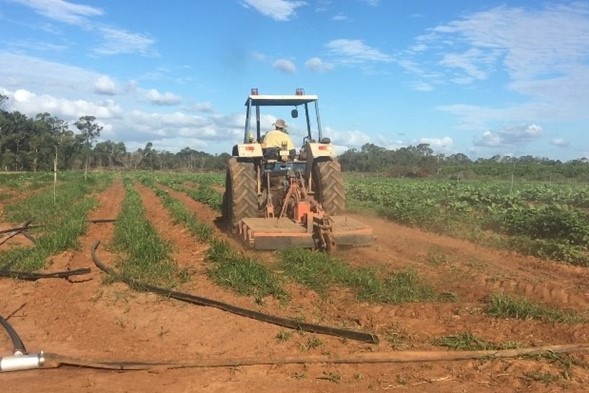
Illegal tobacco crops being destroyed near Bundaberg earlier this year. (Supplied: Queensland Police)
The multi-million-dollar illicit trade is a nationwide problem driven by demand from smokers wanting cheap, tax-free tobacco, known as “chop-chop”, which black-market traders sell for around a third or half of the retail price.
Police sources and stakeholders say any Queensland-based enforcement is heavily reliant on Commonwealth agencies and the national Illicit Tobacco Taskforce (ITTF), which was established in 2018.
Retailers say they have reported black-market traders but are shuffled between various state and federal health and law-enforcement bodies with no agency taking responsibility.
Cash used to fund crime operations
Stakeholders said the black market was undercutting legitimate retailers by up to 50 per cent as rogue traders and organised crime pocketed tens of thousands of dollars in cash each week.
Some illicit traders have installed ATMs in their stores to ensure customers pay in cash.
Stakeholders and police describe the growth in Queensland as “explosive” despite several major seizures and raids netting tonnes of illegally grown tobacco, shop closures and border busts by federal and state law enforcement.
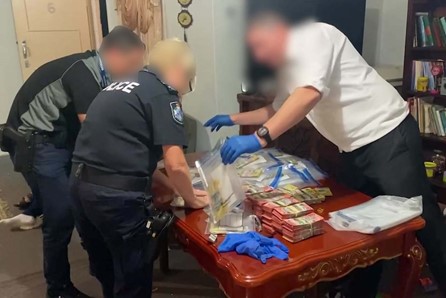
The Queensland Police, ATO and Queensland Health raid in June seized $900,000 in cash.(Supplied: Queensland Police)
Multi-national company, British American Tobacco Australia has hired private investigators to conduct surveillance and collect evidence of the illicit trade to provide to Queensland police.
Earlier this month, the company provided ABC News with surveillance footage of a suburban store south of Brisbane which showed a steady stream of customers including some who had purchased imported cigarettes.
The footage, shot from a public road, also captured two high school students exit the store ripping apart packaging that revealed vapes.
The illegal tobacco products sold can include chop-chop, imported cigarettes and in some cases, vapes. Some of the imported cigarettes, which do not carry mandatory health warnings on their packaging, have a faster burn rate, posing further health and burn risks to smokers
Police sources said they had no powers to enter and search stores selling illicit tobacco or use tools such as covert buys when investigating the drug trade.
Theo Foukkare, CEO of the Australian Association of Convenience Stores, said enforcement of the illicit tobacco trade at a state level was “complicated” because Queensland police had to contact up to four different federal and state government departments to arrange a warrant.
He said despite the “excellent work” of the Queensland police, there has been “an explosion” in black-market traders here in the past 18 months.
“Is it a health department issue that is to do with advertising or packaging? Is it a police issue or an ATO issue for tax evasion? What we are looking for is simple enforcement so that the local police at a state level can actually just simply go in and do their job.” he said.

The pink flowers of a tobacco plant discovered during raids in NSW earlier this year. (Supplied: Australian Taxation Office)
No legislative action
In July, 2016, the state government accepted recommendations from a parliamentary inquiry to establish a register that would licence tobacco distributors and combat the illicit trade.
However, no legislative action has been taken.
Government sources said there were moves to make selling illegal tobacco a criminal offence and establish a Queensland register of licensed distributors.
The potential legislative changes come as industry groups met with Police Minister Mark Ryan and the Department of Health in August.
The groups — including the AAC, Master Grocers Association and the Australian Lottery and Newsagents Association – want an introduction of an affordable licensing register that would help streamline identification of illegal traders.
Mr Foukarre said industry representatives also asked the government to make the sale of illegal tobacco a criminal offence, with hefty fines and jail for repeat offenders.
The industry also wants Queensland police to have the powers to search and enter businesses suspected of selling illegal tobacco.
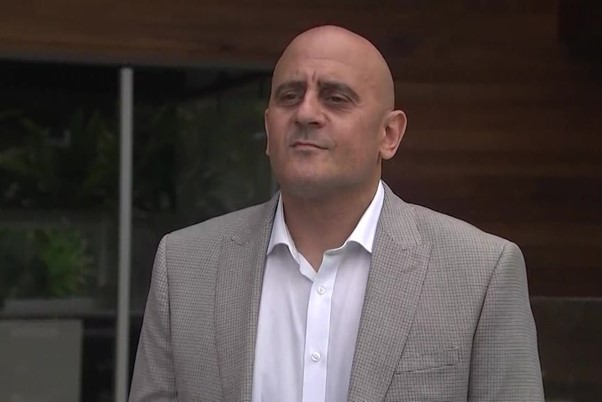
Theo Foukkare, CEO of the Australian Association of Convenience Stores says trade of illicit tobacco continues despite the “excellent” work of police. (ABC News)
Mr Foukkare said while he supports a tobacco licensing scheme, it would not work without strong enforcement and clean guidelines for state authorities to do their job.
Mr Foukkare said the National Illicit Tobacco Strategy, a 2019 recommendation from a federal parliamentary inquiry, would unlock federal funds and powers for state-base authorities to enforce the law.
The Queensland government declined to answer specific questions from ABC News about the trade, saying the Commonwealth government was responsible for illicit tobacco supply.
Queensland police declined to comment and referred the ABC to the Australian Taxation Office (ATO) and ITTF, saying they were the lead agencies.
Queensland Health Minister Yvette D’Ath whose department is responsible for tobacco regulation said Public Health Units proactively target breaches of smoking product laws, including e-cigarettes.
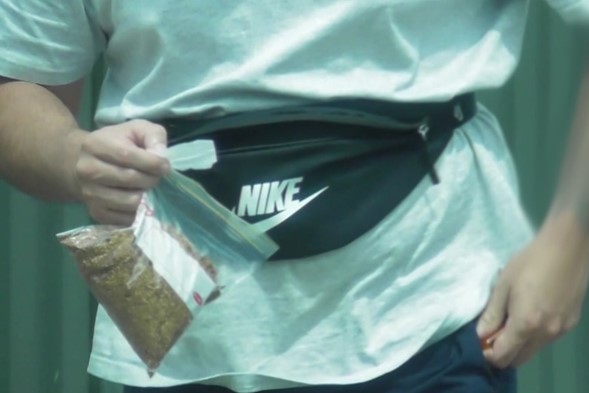
Vision of a chop-chop purchase captured by private investigators. (Supplied: British American Tobacco Australia)
“Queensland Health regularly meets with stakeholders, including retailer groups and partner agencies as part of smoking-product compliance monitoring, review and future strategy development,” she said.
British American Tobacco declined to comment on the use of private investigators but said they would not compete with criminals for business.
The company’s head of Corporate and Government Affairs Josh Fett said the company believes Queensland was being targeted by organised crime looking for new consumers as New South Wales and Victoria were saturated with illicit tobacco stores.
“We’re hearing reports of one new store every week since the beginning of 2020, with 650 per cent increase in the number of stores selling illegal tobacco across Queensland,” he said.
He said the company supported a Queensland licensing scheme, strong penalties and powers to stop the “government bypassing” on the black-market trade.
Queensland police sources said while there is support for enforcement through the ITTF, there needs to be more federal resources at a state level.
They said the Australian Taxation Office, which oversees investigation and prosecution of domestically grown or manufactured illicit tobacco products, has only one Brisbane-based investigator.
Police efforts to curb the ‘$900 million revenue’ lost to government
In May, Queensland Police and the ATO seized around $40 million of illegal tobacco – an estimated 25 tonnes — on a property at Linthorpe, 135 km west of Brisbane.
In June, Queensland Police, Queensland Health and the ATO closed a two-year investigation into illegal trading in the Logan and South Brisbane districts.
Operation Romeo Serge seized 4.5 tonnes of tobacco, $900,000 in cash, 114,732 packets of cigarettes and 150,000 vapes containing nicotine.
The ABF-led Illicit Tobacco Task Force (ITTF) said the black market was dominated by serious organised crime.
ABF Special Investigations Project head, Commander Greg Linsdell said the illicit tobacco trade was not a “victimless” crime and underlined the Commonwealth’s efforts to reduce the impact of smoking on the public’s health.
“It funds serious organised crime that impacts all of us, it’s putting money in the pockets of criminals that will do further harm. It undermines legitimate businesses and we are aware of many businesses that deal in tobacco legally, who are struggling and have been impacted very badly by this illicit trade.
“And of course, there’s $900 million revenue that is lost to the government,” he said.
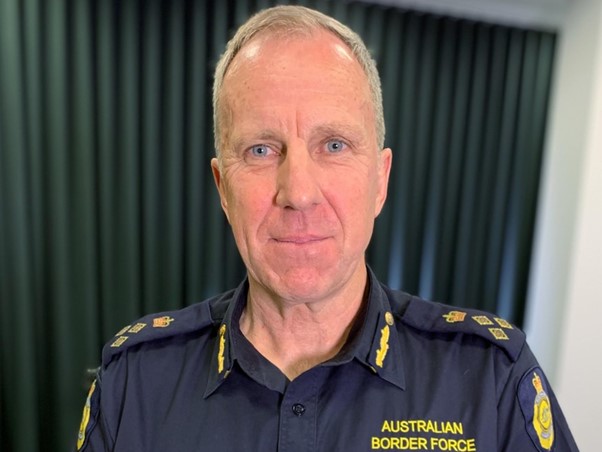
ABF Commander Greg Linsdell says illicit tobacco trade “funds serious organised crime that impacts all of us”.(ABC News)
He reminded the public that buying and selling illicit tobacco is a criminal offence.
Mr Linsdell appealed to the public not to buy the products.
The ABF has found more domestically grown illegal tobacco than previous years, and an increase in 36 per cent in border detections in the past financial year.
The ATO did not respond to questions about Brisbane staffing levels.
The ATO said it has 18 matters under investigation and a further 11 under consideration with the Commonwealth Director of Public Prosecution.
The ATO said it is committed to tackling the shadow economy and creating a level playing field for legitimate businesses.
Cancer Council Queensland General Manager James Farrell said the council had advocated for a licensing scheme for several years, including at the 2016 a parliamentary inquiry.
“…We believe tobacco licensing should be introduced to improve compliance and enforcement of tobacco control measures and provide vital information on tobacco retail and usage,” he said.
Subscribe to our free mailing list and always be the first to receive the latest news and updates.
